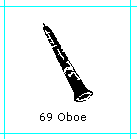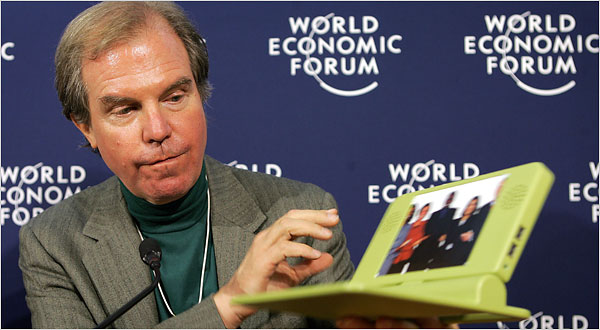View current page
...more recent posts
"Abstract Thinking" [mp3 removed]
Caution: loud, we're talking Ricky Martin loud. I took a few beats from Brains' remixes of my earlier tunes and made some of my own so this tune would bang.
If you happen to be in Scotland tomorrow, please check out the show below. My animated GIFs will be projected 22 times in a line of screens running down a long wall. Earlier I posted a prototype showing how it would work with 4 screens (Double Centrifuge GIF x 4, test of multiple versions: [65 KB Quicktime .mov]).
Fresh NY
Alisa Andrasek, Michael Bell-Smith, Brody Condon, Brent Green, Tom Moody, Takeshi Murata, and Prema Murthy
guest curated by Anne Barlow
New York comes to Perth on Saturday, 3 February 2007. The meeting point is Threshold artspace, the contemporary art gallery at the threshold of Perth Concert Hall. The occasion is Fresh NY--an exhibition which showcases seven of the most exciting young artists working with animation and digital media in the New York region--most of whose work is being seen in Scotland and the UK for the first time. Fresh NY's guest curator is Anne Barlow, a Scot based in New York, previously at the New Museum of Contemporary Art and just appointed Executive Director of Art in General – one of New York's leading not-for profit arts organisations.
"Reflecting current tendencies in contemporary digital art," states Barlow, "Fresh NY includes an intriguing mix of projects, from beautifully crafted animations to hypnotic, computer-generated visuals, and work inspired by gaming culture”.
The public preview of Fresh NY also compliments Bang on a Can--New York's electric chamber ensemble who performs in the concert hall throughout the day including music by Stephen Reich, Philip Glass and Brian Eno. After the all day long public preview, the works featured in Fresh NY will become part of the Threshold artspace collection and shown regularly as part of the daily programmes.
More about the works in Fresh NY
Brent Green, a self-taught animated filmmaker, presents Hadacol Christmas, a strange and haunting story about Mr. Claus who is addicted to Hadacol cough syrup. While aspects of Green’s work conjure up early Walt Disney drawings, the dark animations of Tim Burton, or Appalachian folk-tales, this short film remains a highly personal production.
Together with Green, the artists Tom Moody and Michael Bell-Smith share a love of the 'lo-fi”, but their influences come more from their immediate 'graphic landscape' of mobile phone visual displays, urban media screens, and web page advertisements.
Tom Moody proudly creates low-tech art with standard off-the-shelf products such as simple paint programmes, photocopiers and consumer printers. The Threshold Wave goes franticly busy with Moody's tiny animated GIFs now scaled up to optical art proportions. Moody belongs to a current generation of artists, who use those twinkling and often irritating image files that draw your attention on a web page, known as GIFs, in playful or ironic ways.
Michael Bell-Smith also operates in the gap between 'smooth' or low-tech aesthetics; animated cartoons and painting with unusual effectiveness Much of his work is created by sampling and manipulating images from the Internet. As part of Fresh NY he presents Some Houses Have Pools – a dreamlike aerial view of an endless suburbia, devoid of any specific narrative. Bell-Smith's main concern is color, space and light, tweaked and amplified by digital technology and restrained animation.
Alisa Andrasek's work The Invisibles makes its debut on an extra large scale at the Threshold Wave of 22 screens. It consists of swirling and mesmeric 3D cells scripted in animation software. Andrasek, who principally works in the field of architecture, is interested in creating what she calls a “pattern intelligence” – which can be applied to surfaces and forms in architecture, design, and fashion.
Takeshi Murata pushes the boundaries of animation and psychedelia with sophisticated code-based image processing. Recreated as a hypnotic 22 screen installation Monster Movie is one of his most celebrated video work. Its lead character is a B-movie Yeti who decomposes and reconstitutes thirty times per second, becoming a seething, digital morass of color and form. “Murata’s particular genius is an almost alchemical ability to transform forgotten relics of pop culture into dazzling jewels” comments the American art journal Artforum.
Brody Condon's widely acclaimed work Karma Physics < Elvis is a tongue-in cheek, self-playing version of the popular computer game Unreal 2003. As the viewer's camera floats through an infinite pink afterlife, multiples of Elvis are controlled by 'Karma Physics' – the original game's engine used to simulate realistic game character death. Condon's work represents a highlight in the art games series showing on the Threshold Stage all year round.
Prema Murthy uses numerical information and video as a sculpting tool. As part of Fresh NY the artist presents an especially re-worked short film starring some of her strange creatures. The bodies integrate and disintegrate according to their fluctuating data values. Murthy's tool is a 3D modelling software programme and her skills involve sifting through tons of digital data such as immigration patterns, effects of global warming, and consumer spending.

Didn't listen to all the entries in WFMU's sixty second song contest but this version of "In-a-Gadda-da-Vida" by Stiever deserves a vote [very small .mp3]. Another keeper is Otis Ball's "More Than Half-Off-Bird" [another small .mp3]. The "strategic cut of death" pieces are preferable to the obvious mashups and speedups.
Edward B. Rackley on those $100 laptops for 3rd World kids we've been hearing so much about:
I'm soon headed to northern Uganda to research violations against children by the Lord's Resistance Army and the Ugandan National Army. I'll keep one eye skyward for any falling laptops--although such spacejunk is already common in rural Africa. I used to work with Dinka pastoralists in Southern Sudan who decorated their cattle by hanging discarded CDs from their horns. The CDs were recovered from the trash pits of international NGOs working to improve the lives of southerners during the war with Khartoum. Of course they had no idea what the CDs were, other than round reflective disks once used by foreigners. What would the Dinka do with laptops? Maybe trap wild game in the mighty jaws of the hinge mechanism connecting keyboard and screen.On discussions of the laptop at Davos:
Their debates over how to solve the global 'digital divide' bear the mark of all starry-eyed social engineering endeavors, with the world's digitally illiterate providing a conveniently captive set of guinea pigs. Lack of food, water, education and safety for many in the developing world apparently matter little when you can throw a $100 laptop at the problem.

"Nicholas Negroponte of M.I.T. shows off his $100 laptop"--NY Times caption and photo.
2001 [counter-directional arrows] 2006
Jason Kottke: "Nasty Nets used CSS positioning to 'embed' one YouTube video into another. 'Be sure to hit "play" on both YouTubes.' Reminds me of the animated GIF mashups (link)."
Hello, content? Who cares about CSS positioning?
As Theodor Adorno described the work: "An exquisite and in some ways exquisitely awful play of symmetries. The 1968 'state of the art' trip sequence from 2001: A Space Odyssey, its widescreen magnificence reduced to YouTube size, serves as a continuously running background to a smaller YouTube nested within its boundaries. The foreground film consists of a simple but somewhat relentless montage of photos made by teenagers playing with basic iPhoto effects, while Queen chugs along on the soundtrack.
"The split screen, mirror image appears in both foreground and background: one limns a cleavage in space-time, expansive, landscape-embracing, the other barrages the viewer with portrait grotesqueries, cartoonish Francis Bacon-like horrors caused by flipping selected facial features. Yet there are 'crossover points' where the faces widen and flatten into topographic arrays and the Kubrick film jumps to contorted portrait closeups of Keir Dullea's agonized face.
"The background clip has pretentions to high culture with its doom-laden Ligeti score and references to Modernist abstraction yet it is ultimately still a mass market popcorn movie. The teens' use of iPhoto exploits the most readily available computer imaging gimmicks such as 'spherizing' but is actually superior in its quick, intuitive sense of play to the ponderous 'high art' uses of the exact same tools by artists such as Lucas Samaras. As above so below, art mirrors the street and vice versa."
Update: I changed the title of this post because it was fuX0ring my RSS feed. I really, really, really hate the inflexibility of RSS and wish people would just bookmark me like in the old days.

"Let's go take another look at The Year in the Internet 2006!"
I've been enjoying this music on the WFMU download page (scroll down) from "an obscure bootleg of German minimal synth stuff from 1979-1983 entitled Kassettentater (Cassette Offender)." Especially good is the first track "Steig Den Luis Trenker" by 4172. Any help from a German language speaker on the content (just a rough idea) would be appreciated. The wikipedia bio on Trenker, an Austrian-Italian film director, architect, and actor, is interesting:
His first contact with film came in 1921, in which he helped director Arnold Fanck on one of his mountain films. The main actor could not perform the stunts required, and so Trenker assumed the leading role. He gradually assumed more roles on set, and by 1928 was directing, writing and starring in his films. By this year he had abandoned his job as an architect to concentrate on art and married Hilde Bleichert, with whom he had four children.Update: Thanks to drx for explaining that the song is a response to "Tanz den Mussolini" by DAF. He says:
The main theme of Trenker's work was the idealization of connection with the homeland and pointing out the decadence of city life. This loosely played into the hands of Nazi propagandists, who seized upon the nationalistic elements of his work. However, Luis refused to allow his work to subverted as such and eventually moved to Rome to avoid further governmental pressure. This, though, was not to be and after a pair of documentary films Trenker returned to Bolzano to quit making movies.
After the war Trenker was accused of fascist opportunism but eventually the charges were dropped. In the mid 1950s he again able to make movies, though by 1965 he had switched mainly to the documentary form, focusing mainly upon the Austrian Tyrol.
[T]he arrangement and lyrics are nearly identical. Instead of Hitler and Mussolini and Jesus Christus, this song covers some (at the time of recording) contemporary Germans and Austrians. Like actors (Harald Juhnke), publishers (Axel Springer), sportsmen (Niki Lauda, Toni Sailer) etc ... some i cannot understand. Probably they are dead already. But the ones i recognize have been very important or still are. Only some have to do with right wing stuff, like Axel Springer. Others had plane crashes or were just terrible people on TV every day.
Instead of "Dance the Mussolini" we have verbs that go with things these people were famous for, like "drink the Harald Juhnke", coz he was an alcoholic.
All DAF fans can for sure enjoy this bootleg :)
